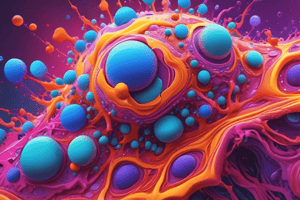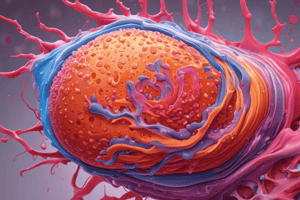Podcast
Questions and Answers
What term describes a reduction in cell size due to stressors?
What term describes a reduction in cell size due to stressors?
- Atrophy (correct)
- Metaplasia
- Hypertrophy
- Hyperplasia
What type of injury is caused by infectious agents like viruses?
What type of injury is caused by infectious agents like viruses?
- Toxic injury
- Infectious injury (correct)
- Deficit injury
- Physical injury
Which of the following adaptations leads to an increase in cell number?
Which of the following adaptations leads to an increase in cell number?
- Dysplasia
- Hyperplasia (correct)
- Atrophy
- Metaplasia
What does not typically result in cell injury?
What does not typically result in cell injury?
Which process replaces one cell type with another due to stress or injury?
Which process replaces one cell type with another due to stress or injury?
Which of the following best describes nonspecific cytoplasmic changes in elderly cells?
Which of the following best describes nonspecific cytoplasmic changes in elderly cells?
What is a common cause of physical injury to cells?
What is a common cause of physical injury to cells?
Which factor does not typically contribute to the cell aging process?
Which factor does not typically contribute to the cell aging process?
In which scenario do cells typically die from injury?
In which scenario do cells typically die from injury?
Which adaptation occurs when a cell experiences increased workload?
Which adaptation occurs when a cell experiences increased workload?
Flashcards
Cell Injury
Cell Injury
Damage to a cell, potentially caused by biochemical lesions, toxins, infections, or physical/deficit injuries.
Cell Adaptation
Cell Adaptation
Cells responding to stress by adjusting size, number, or type to maintain function.
Atrophy
Atrophy
Cell size reduction and decrease.
Hypertrophy
Hypertrophy
Signup and view all the flashcards
Hyperplasia
Hyperplasia
Signup and view all the flashcards
Metaplasia
Metaplasia
Signup and view all the flashcards
Dysplasia
Dysplasia
Signup and view all the flashcards
Toxic Injury
Toxic Injury
Signup and view all the flashcards
Infectious Injury
Infectious Injury
Signup and view all the flashcards
Physical Injury
Physical Injury
Signup and view all the flashcards
Deficit Injury
Deficit Injury
Signup and view all the flashcards
Cell Degeneration
Cell Degeneration
Signup and view all the flashcards
Cell Death(Necrosis)
Cell Death(Necrosis)
Signup and view all the flashcards
Study Notes
Cellular Adaptation
- Cells are the basic building blocks of organisms, forming tissues and organs that integrate into body systems.
- Cells encounter challenges like stressors and diseases throughout their lifespan, affecting their normal function.
- Cells respond to stress by using reserves to continue functioning or adapting through changes like atrophy (size reduction), hypertrophy (size increase), hyperplasia (cell number increase), metaplasia (cell type replacement), and dysplasia (abnormal growth).
Cellular Injury
- Cell injury can result from biochemical lesions and be influenced by toxins, infections, or physical and deficit injuries.
- Toxic injury is caused by internal (endogenous) factors, like metabolic errors, or external (exogenous) factors, like drugs and alcohol.
- Infectious injury is caused by agents like viruses and bacteria.
- Physical injury occurs from thermal or mechanical disruptions.
- Deficit injury occurs due to deficits in water, oxygen, nutrients, temperature regulation, or waste disposal.
Cellular Degeneration, Aging, and Death
- Nonlethal damage generally affects the cytoplasm, caused by factors like swelling, fatty infiltrates, and atrophy.
- Cells lose structure and function with aging, influenced by factors like injuries, wear and tear, and both intrinsic and extrinsic factors.
- Intrinsic factors include metabolic and nutritional factors.
- Extrinsic factors include physical agents, chemicals, and infectious agents.
Summing Up
- Cells are the basic units of life, forming tissues, which create organs and body systems.
- Cell function can be altered by stressors and diseases.
- Cells may adapt, use reserves, or fail under stress. Common cell changes include atrophy, hypertrophy, hyperplasia, metaplasia, and dysplasia.
- Cell injury can indicate and cause diseases.
- Cells can be injured by toxic, infectious, physical, or deficit factors, possibly leading to death (necrosis).
- Cell degeneration and aging can be slowed by treatment.
- Aging affects cells, reducing elasticity, muscle mass, and causing changes in skin.
- Both intrinsic and extrinsic factors influence cell lifespan and aging.
Studying That Suits You
Use AI to generate personalized quizzes and flashcards to suit your learning preferences.




